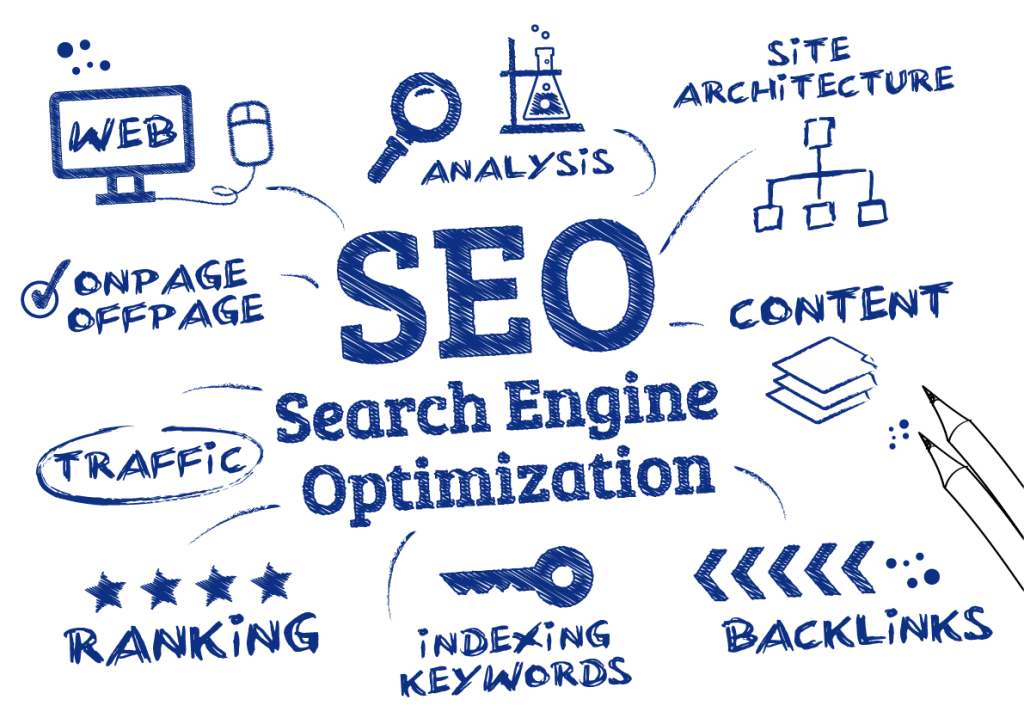Real Estate Search Engine Optimization
Unleashing the Power of Real Estate SEO: A Guide to Rank Higher and Generate Leads In today’s digital age, where the majority of homebuyers and sellers turn to the internet to search for properties and real estate agents, having a strong online presence is crucial for success in the competitive real estate market. That’s where Real Estate search engine optimization (SEO) comes into play. But, why is search engine optimization important for real estate professionals? The answer lies in the power of online visibility. When potential buyers or sellers search for real estate-related information, they often rely on search engines like Google, Bing, or Yahoo to find what they need. By optimizing your real estate website for search engines, you can increase its chances of appearing on the first page of search results, where most users tend to click. This guide will take you on a journey to unlock the potential of real estate SEO. We will delve into various aspects, from understanding the fundamentals of SEO and the importance of using real estate-specific keywords, to optimizing search engines for local SEO, catering specifically to real estate agents. Real estate SEO keywords will play a vital role in driving targeted traffic to your website. We’ll explore effective techniques for conducting keyword research, identifying relevant terms that potential clients are searching for, and incorporating them strategically into your website content. Moreover, we will explore the significance of local SEO for real estate agents. Local SEO allows you to target a specific geographical area, ensuring that your website appears prominently in local search results. Ultimately, this guide aims to equip you with the knowledge and tools to not only rank higher on real estate search engines in the US but also generate a steady stream of leads. We’ll delve into conversion rate optimization techniques, the implementation of lead capture forms and landing pages, and effective methods to engage with prospects through personalized content. So, are you ready to unleash the power of real estate SEO? Let’s dive in and discover how optimizing search engines can elevate your online presence, attract more visitors, and ultimately, boost your success in the competitive real estate market. To embark on our journey of understanding real estate SEO, let’s start by defining what SEO is and exploring its key components. What is Search Engine Optimization? Search Engine Optimization (SEO) refers to the practice of optimizing a website to improve its visibility and ranking on search engine results pages (SERPs). The goal is to attract organic (non-paid) traffic by ensuring that your website appears higher in search results when users search for relevant keywords or phrases. The key components of SEO include: On-Page Optimization: This involves optimizing various elements on your website to make it more search engine-friendly. It includes optimizing meta tags (title, description), header tags, URL structure, image alt tags, and improving website speed and mobile responsiveness. On-page optimization ensures that search engines can understand and index your website’s content effectively. Off-Page Optimization: While on-page optimization focuses on improving your website’s structure and content, off-page optimization deals with external factors that influence your website’s visibility. This primarily includes building high-quality backlinks from other reputable websites to enhance your website’s authority and credibility in the eyes of search engines. Keyword Research: Keywords are the terms or phrases that users enter into search engines when looking for specific information. Keyword research involves identifying relevant keywords related to the real estate industry that potential clients are likely to use in their searches. By targeting the right keywords, you can optimize your website’s content and improve its chances of ranking higher in search results. The Role of Keywords in Real Estate SEO Keywords play a crucial role in real estate SEO. By incorporating relevant keywords into your website’s content, you can increase its visibility and attract targeted traffic. When conducting keyword research for real estate, it’s important to consider both broad and long-tail keywords. Broad keywords, such as “real estate” or “homes for sale,” have high search volumes but also high competition. Long-tail keywords, on the other hand, are more specific phrases that usually have lower search volumes but also lower competition. Examples of long-tail keywords in the real estate industry could be “luxury homes for sale in Los Angeles” or “condos for rent in Miami Beach.” By optimizing your website’s content with a mix of broad and long-tail keywords, you can capture a wider range of potential clients and increase your chances of ranking higher in relevant search results. On-Page Optimization Techniques for Real Estate Websites On-page optimization techniques are crucial for improving your website’s visibility and search engine rankings. Here are some key techniques specific to real estate websites: Quality Content Creation: Create high-quality, informative, and engaging content that addresses the needs and interests of your target audience. Incorporate relevant keywords naturally into your content while ensuring it remains valuable and user-friendly. Meta Tags Optimization: Optimize your meta tags, including the title tag and meta description, with relevant keywords. These tags provide concise summaries of your web page content and appear in search results, influencing users’ decision to click on your website. URL Structure: Ensure your website’s URL structure is clean, concise, and includes relevant keywords. Use hyphens to separate words in URLs, making them more readable and search engine-friendly. Header Tags: Use header tags (H1, H2, H3, etc.) to structure your content and highlight important sections. Incorporate relevant keywords naturally within header tags to signal the relevance of your content to search engines. Image Optimization: Optimize your website’s images by using descriptive file names and alt tags that include relevant keywords. This helps search engines understand the content of your images and improves accessibility for users. Off-Page Optimization Strategies to Improve Search Rankings Off-page optimization plays a crucial role in real estate SEO as it focuses on improving your website’s visibility and authority beyond its own pages. Here are some effective off-page optimization strategies: Link Building: Build high-quality backlinks from reputable and relevant websites. Seek opportunities
Real Estate Search Engine Optimization Read More »




